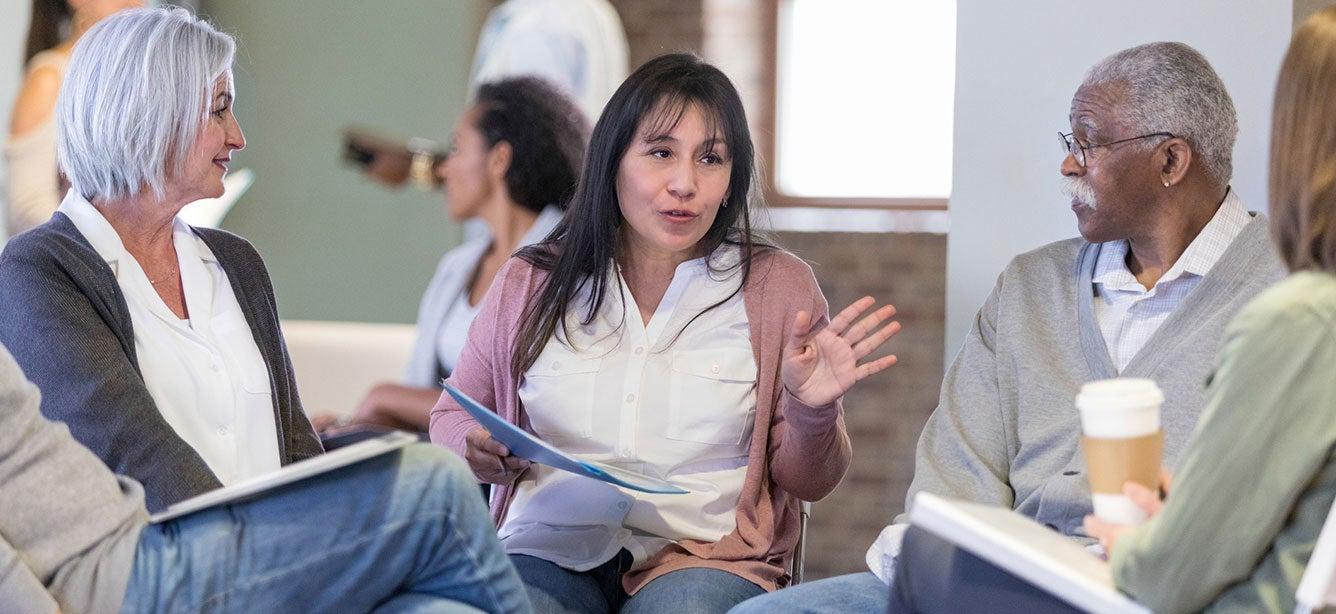Tip Sheet: Strategies to Improve Leader Retention for Chronic Disease Self-Management Education
8 min read

What We Know According to the National CDSME Database, from 2010-2018:
- Trained leaders deliver a lifetime average of 7 workshops.
- Paid leaders tend to deliver more workshops than volunteers.
- Health care settings are the most common site for delivery of CDSME programs.
Eight Strategies for Retaining Dedicated Program Leaders: Lessons from the Field
1. Carefully designate the responsibility of recruiting and supervising leaders.
This individual should be dedicated to the implementation of evidence-based programs, have knowledge of CDSME programs, and adequate time for recruitment, screening, and ongoing training and supervision.
2. Establish and communicate clear expectations for leaders during the recruitment process.
Be specific about where you need leaders and what you expect from them. Many states have written position descriptions for leaders clarifying expectations and the commitment being made by the leader. In addition, several organizations require that leaders must complete a background check and a confidentiality form, in addition to an application. Explore several examples of position descriptions and leader applications to develop the best option for your community.
- The California Department of Aging’s volunteer toolkit
- Sound Generation’s (Washington) volunteer leader position description
3. Screen and select candidates deliberately.
It is better to recruit and train fewer dedicated leaders who understand the expectations of the position than numerous leaders who are not committed to delivering workshops. Leaders who understand their roles and responsibilities can improve program quality, which in turn can positively affect participant retention. Recognize that not all who sign up for leader training are a good fit. It is better to part ways with potential leaders who do not show aptitude or initiative early, rather than hoping they will improve. Check out the following screening tools shared by organizations across the country.
- Partners in Care Foundation (California) developed screening and orientation forms to identify potential leaders. After a phone screening by staff, volunteers are oriented using a presentation and orientation packet and sign the agreement on the last page. They also complete security awareness training and a background check.
- At the Office of Services to the Aging in Michigan, staff share that the screening process is not final until potential volunteers complete practice teaching at leader training and sign a contract outlining responsibilities.
4. Look for leaders affiliated with a host or partnering organization from the community.
These individuals are often strong leaders, familiar with the cultural background of participants, and open to opportunities for self-improvement. Leaders that have these characteristics are frequently recruited as workshop participants and have already experienced the benefits of the program and believe they are effective. Participants who have a success story or are supportive of the program make particularly great leaders. Look for leaders who are living and working in the community – and who speak the language most commonly spoken in the targeted community.
- The Office of Services to the Aging in Michigan has found that disease-specific programs often have a high number of self-referrals that are later interested in becoming leaders.
- Delaware’s Department of Health and Social Services seeks leaders with a direct relationship to the type of class being taught.
- Sound Generations (Washington) finds that having one dedicated staff member paired with a volunteer is helpful.
- Florida Health Network has learned that one size does not fit all. Recruitment strategies will vary based on the organization, location, number of counties served, staff availability, and funding, among other factors.&
5. Schedule workshops for each new leader within one month of training and assist with recruitment, workshop location, transportation, and other logistical details.
It’s important to get new leaders started with their first workshop quickly after training and to develop the capacity to support them in finalizing logistical details for the workshop. If possible, schedule the first workshop before leaders even begin their training, to ensure there is a strong commitment. If the potential leader does not follow through with the training, you may have to quickly find another leader, but this is better than training leaders who will never teach. Many organizations also shared the benefit of establishing a mentoring system to pair experienced leaders with new leaders for the workshop.
6. Communicate clearly and often through regular meetings with leaders– by phone, email, or in person.
Although organizations use different approaches, the message is clear that program leaders need ongoing support and training to stay engaged and improve their workshop leadership skills. Regular calls, newsletters, or meetings may be used to share successes and challenges, or discuss fidelity and training requirements. NCOA’s Best Practices Toolkit: Resources from the Field includes numerous recommendations about how to keep leaders engaged. Read examples below from states that schedule regular training for program leaders.
- In Utah, the Department of Health program coordinators and leaders convene bi-monthly through the statewide Living Well Coalition. In addition, each coordinator communicates with their leaders when teaching workshops, during fidelity checks, or through e-mail updates. Utah's larger health care systems and many other program coordinators take the lead on offering annual celebrations of service for volunteers and the Arthritis Program supports these efforts as needed. Communicate clearly and often through regular meetings with leaders– by phone, email, or in person. Although organizations use different approaches, the message is clear that program leaders need ongoing support and training to stay engaged and improve their workshop leadership skills. Regular calls, newsletters, or meetings may be used to share successes and challenges, or discuss fidelity and training requirements.
- Partners in Care Foundation (California) sends a volunteer e-newsletter to spotlight volunteers, trainings, and events, and has dedicated staff to provide ongoing technical assistance to volunteers by phone or e-mail.
- Florida Health Networks conducts regular fidelity monitoring, coordinates annual refresher training for all leaders, and keep leaders updated on any program changes.
7. Many—although not all—of the organizations with high leader retention have implemented systems to centrally market workshops and recruit participants and leaders in a specific state or region.
- Partners in Care Foundation (California) uses a geomapping tool to evaluate geographic coverage of program leaders. They have staff who conduct outreach and work with sites in the community to schedule workshops.
- In Delaware, all self-management education programs are centrally marketed on the Healthy Delaware website. Program leaders generally seek out host sites for workshops or collaborate with the Delaware Medical Reserve Corp to be notified through a listserv of workshops in need of program leaders.
- In Utah, workshops are scheduled independently by delivery system coordinators who assign leaders to cover classes based on availability and workshop logistics. Each delivery system partner markets their workshops, but the Department of Health also has a marketing webpage.
8. Recognize, validate, and celebrate the work being done by leaders. Tell—and show—program leaders how much they are valued.
Organizations across the country recognize the importance of volunteer program leaders in implementing evidence-based programs for older adults. It’s important to think of ways to show appreciation, like an annual celebration of service, holiday events, “thank you” cards, and statewide conferences.
- In Washington, Sound Generations conducts leader satisfaction surveys to assess the communications methods that are most valued by leaders and sends “thank you” letters after each workshop as well as at the end of the year.
- In Michigan, the Office of Services to the Aging hosts an annual statewide conference for program leaders, as well as regional meetings throughout the year.
- In Illinois, the Center for Research on Health and Aging at the University of Illinois at Chicago staff conduct fidelity site visits to new sites and use the visits to invite outstanding instructors to become regional master trainers.
Resources
- Tip Sheet: Increasing Completion of CDSME Workshops
- NCOA's Best Practices Toolkit: Resources from the Field
- Leader Screening Protocol: New York implemented a screening protocol that includes the administration of interview questions.
- Leader Recruitment Toolkit: Massachusetts developed a leader recruitment toolkit that includes a description of leader requirements, such as an agreement to attend the full training, working with a co-leader to facilitate the workshops, following a script, and being comfortable speaking in front of groups. They also hold an annual “Sharpening Your Skills” conference.
- Memorandum of Understanding: Connecticut has a Memorandum of Understanding for leaders that outlines their responsibilities.
This project was supported, in part by grant number 90CS0058, from the U.S. Administration for Community Living, Department of Health and Human Services, Washington, D.C. 20201. Grantees undertaking projects under government sponsorship are encouraged to express freely their findings and conclusions. Points of view or opinions do not, therefore, necessarily represent official Administration for Community Living policy.



